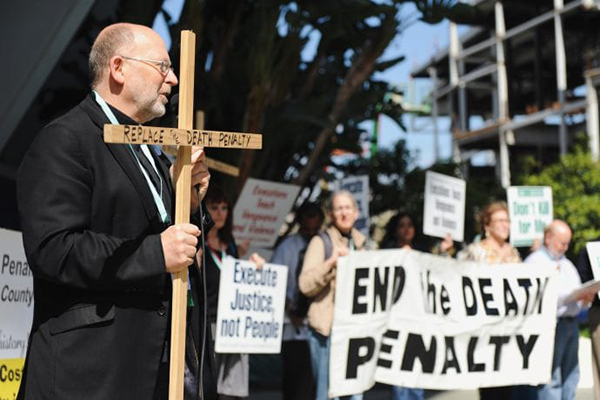
By Christopher White, National Correspondent
NEW YORK — For five years in a row, there have been fewer than 30 death penalty executions and fewer than 50 death sentences, according to a new report that chronicles a continued dramatic decline in the use of capital punishment in the United States.
The new report, released Dec. 17 by the Death Penalty Information Center (DPIC), notes that there were 22 executions in 2019, down slightly from 25 in 2018 and that in that same time, New Hampshire abolished the practice and California declared a moratorium on executions.
According to the report, executions only took place in seven states during 2019, and Texas accounted for 41 percent of those executions. As for issuing new death sentences, Florida and Ohio held the record, with both states imposing six sentences each over the last year.
During that same time, courts across the country halted more executions – a total of 24 throughout the year – than the 22 that were carried out.
In addition, the U.S. Supreme Court has left in place a preliminary injunction, which prohibits the government from carrying out the first federal executions in 16 years – despite the fact that in July, the Trump administration announced that it intended to resume federal executions after the 16-year hiatus.
Robert Dunham, executive director of DPIC, told The Tablet that it is important to view the federal jurisdiction as one jurisdiction among others and that the question with the Trump administration was whether they were going to follow the state trends and not impose the practice or whether they were going to be an outlier.
“It’s clear they were going to be an outlier,” he said.
“The death penalty is disappearing in whole regions across the United States,” he continued. “You can now drive from the northeastern tip of Maine to the southwestern tip of West Virginia without setting tire in a death penalty state.”
Further, he said that states west of Texas have not seen an execution in the last five years and that efforts are underway in both the Republican controlled legislature in Wyoming and the Democratic controlled legislature of Colorado to end the practice, giving it bipartisan momentum throughout the United States.
In June, the United States Conference of Catholic Bishops (USCCB) voted to revise the U.S. Catechism as a follow-up to Pope Francis’s August 2018 decision to update the global Catechism of the Catholic Church declaring the practice of the death penalty to be inadmissible.
During his September 2015 address to a joint session of the U.S. Congress, Pope Francis applauded the U.S. bishops for their efforts to abolish the death penalty.
“Not only do I support them, but I also offer encouragement to all those who are convinced that a just and necessary punishment must never exclude the dimension of hope and the goal of rehabilitation,” he said at the time.
Dunham highlighted the Catholic Church’s attention to the issue, noting that in certain states the efforts of Catholic leaders have been critical to securing support for legislation to oppose the practice.
In New Hampshire, he noted, that the moratorium was enacted with a veto proof majority in the house and the senate.
“They needed every vote to make it bulletproof, and it would not have happened without the Catholic Church,” he said.
Looking ahead, he said, “the efforts of Wyoming’s Catholics will be critical.” He also said that the Church’s influence is equally noticeable in places like Utah, which isn’t predominantly Catholic, and Louisiana, which is.
“Anytime an effort to change a policy is bipartisan and depends upon a successful coalition to bring it about, the efforts of all of the partners in the coalition is critical,” he observed.
Earlier this year, the Catholic Mobilizing Network, the leading Catholic organization opposed to the death penalty, celebrated its ten-year anniversary, where they noted that when the organization was first founded, 35 states across the country permitted the practice. Today, that number is down to 29.
“There’s no turning back. The death penalty is dying a death in the United States,” executive director Krisanne Vaillancourt Murphy said at the time. “We have to get it over the finish line, but there’s no turning back.”
